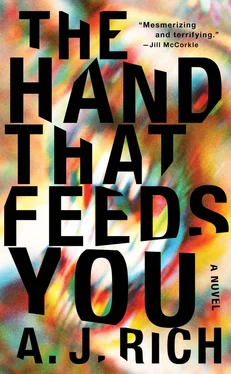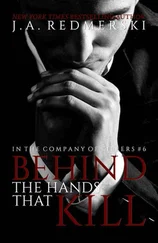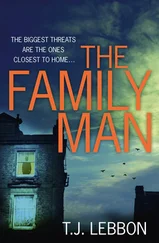Is this where Cloud would stay? In a garage?
“We’re in and out all day,” Alfredo said. “The dogs who stay here get stimulation, they get ‘enrichment’—we take them outside to play, but not with the other dogs.”
Another crate was against the opposite wall from the German shepherd. I didn’t see the dog in it at first — she had burrowed under the blankets. But when Alfredo passed by, the dog poked her muzzle out and licked at the wire. She was some kind of hound mix, with a frosty muzzle — an old dog with cloudy eyes. Was this the dog whose death would make room for Cloud? I hated myself for the opportunistic thought.
“How’s the dog I brought in doing?” Billie asked.
“She’s being walked now. Bridget has her out.” Alfredo told us that Bridget was a new volunteer, who took time from her nursing job at the nearby hospital to help them out. Alfredo said that the rottie had calmed down a good deal since arriving at For Pitties’ Sake.
“That’s great,” Billie said. “I worried about that one.”
“When could you take Cloud?” I asked Alfredo.
“The vet said that Boss — the hound mix you saw — probably has a few weeks at best.”
I wanted to stay to meet the director, but Billie said she needed to get back — she had tickets to see a play at St. Ann’s Warehouse. She said tickets , plural, so of course I felt I knew whom she was going with.
Not until we entered Greenwich did Billie ask if I would mind if we stopped at her grandmother’s house for a minute so she could pick up her snorkel and fins.
“I’ve got time,” I said.
Billie left the parkway, and within minutes she turned onto Round Hill Road, then onto Clapboard Ridge Road. The driveway was so long that Billie had to slow down a couple of times. “Speed bumps in your driveway are a status symbol here,” she said drily.
Her grandmother’s was a farmhouse on steroids. We pulled into the immense turnaround, passed the portico, and parked behind the house.
“Looks like she has company,” I said.
“Those are just the house cars,” Billie said. “For guests,” she added, when I didn’t understand.
The “house cars” were newer models than the car Billie drove.
“We’ll go in the back way. I want to say hello to Cook first.”
Ah, I thought — the sign of wealth: Billie dropped the article. Not the cook, but Cook.
The kitchen was spacious, spectacular, but also warm. It didn’t look like a place where servants worked. Copper pots — dozens of them — hung from racks above the ten-burner stove. Cook, aka Jennifer, was a middle-aged woman with an Irish accent who greeted Billie with a hug and a kiss on the cheek. She was not in uniform, but wore an apron over a simple dress.
“Your grandmother is in a mood,” she confided. “Last night was the gala for Children’s Hospital, and she expected to raise more.”
“She’s never satisfied with the money raised,” Billie said. “The money she raises at a single gala would run a rescue organization for a year. Not that she’d ever offer.”
“Will you two be staying for dinner?” Cook asked.
“I’ve got theater tickets,” Billie said.
Cook asked me what we were going to see. I looked to Billie, who said, “I have a date.”
“Well, I’ll send you home with a peach cobbler,” Cook said. “Your grandmother is in the library.”
I had tons of books, but most were still in milk crates.
Billie led me through several corridors and then upstairs. The door to the library was open. I could see red lacquered walls and glass-fronted bookcases. The couches looked like feather beds in a fairy tale.
Billie’s grandmother was seated at her desk, her back to us. Her long gray hair was loose and reached below her shoulders. Rebellious, I thought, that she didn’t have it colored and still wore it long.
She finished signing a check before she turned around. “You smell like a kennel, darling.”
“Cook said you were disappointed about last night.”
“Who is your friend?” the grandmother asked, not looking at me.
“She’s a client of the lawyer I’m working with. Morgan Prager.”
I said it was nice to meet her. I held out my hand, but took it back before she could shake it, apologizing that I hadn’t had time to clean up after we visited the dog sanctuary. Billie’s grandmother seemed relieved not to have to make contact.
“Do you remember where I left my snorkel and fins?” Billie asked.
“Where are you off to now?”
“I’m going down to pick up some patty-cakes in St. Thomas.”
Billie said nothing acknowledging my annual trip to save these dogs. She hadn’t known what a patty-cake was until I had told her. Still, how could I begrudge this lapse — she was going to do something good. I could begrudge her because I figured she was going to do it with McKenzie.
“There aren’t enough stray dogs for you here?” the grandmother asked.
This was an old argument, I saw.
“I thought I’d get a couple of swims in. A little R and R.”
I hoped the grandmother would ask if Billie was going alone. Instead she asked Billie to look up an old friend of hers on the island. “She keeps a boat there.”
“Like I’ll have time.”
“It doesn’t cost you anything to be nice,” her grandmother said, and then to me, “I’ll bet you would make time.”
“I’m not going.”
Billie said to me, “You’d think my grandmother didn’t like dogs.”
“Winston wasn’t a dog.”
“Winston was an English bulldog,” Billie told me. “He passed gas all the time, and at my grandmother’s parties, she would follow him around in her gown, lighting matches behind him.”
“But philanthropy means ‘love of humans,’ ” the grandmother reminded us. “Not dogs.”
Billie looked stricken and forced herself to kiss her grandmother’s cheek before we went to look for her diving gear.
“It should be in my old closet.” Billie led me into — not a bedroom, but a suite. Not a suite — a wing! Where were the equestrienne trophies and ribbons? Where was any sign of a headstrong girl? Nothing in these rooms said that a child had grown up in them. What was missing in addition to any childhood mementos was furniture. The floors were carpeted wall to wall in the whitest of wool. The walls were painted the same white — and the sheen told me that an expensive egg tempera had been used. On the walls were paintings that even I recognized: Franz Kline, Ellsworth Kelly, de Kooning, Motherwell — it was a gallery.
“The Kline was my grandfather’s first purchase,” Billie said. “You’ll appreciate this: when Kline brought his mother to his first exhibition of large abstractions — slashes of black paint across white canvas — his mother said, ‘I always knew you’d take the easy way out.’ ”
“What did the rooms look like when you were growing up here?”
“My grandmother had her decorator do Young Girl’s Room. I had a four-poster canopy bed with linens from Frette, framed horse prints on the walls, a Princess Anne Victorian dollhouse. In the bathroom: Baccarat tumblers; the mouthwash was decanted. As Rebekah Harkness said of her family’s mansion in Manhattan, ‘It’s not home, but it’s much.’ ”
Billie opened one of the walk-in closets, which was as crowded as the rooms were spare: boxes of plastic horses, games of Scrabble and Parcheesi, countless stuffed animals, computer games, a large box filled with toy soldiers, a row of Slinkys, Rollerblades and badminton racquets, a pogo stick, skis, but no diving gear.
Was there anything Billie had not been given as a child?
She did not find her diving gear. “Fucking hell.” Billie slammed the closet door. She did not stop for the peach cobbler.
Читать дальше

![Корнелл Вулрич - Eyes That Watch You [= The Case of the Talking Eyes]](/books/32103/kornell-vulrich-eyes-that-watch-you-the-case-of-thumb.webp)









